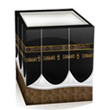The ruling on drying the Limbs after Wudhu'
- Details
- Category: Sheikh Otheimin
- Published on Tuesday, 12 November 2013 11:43
- Hits: 955
The ruling on drying the Limbs after Wudhu'
Question:
Is it permissable to dry the limbs after making Wudhu?
Answer:
Yes, it is permissible for a person to dry his limbs after making Wudhu, and likewise, if he makes Ghusl, it is allowed for him to dry his limbs.
This is because the basic principle is permissibility in matters other than acts of worship, unless there is any evidence of its prohibition.
As for the Hadith of Maimunah, may Allaah be pleased with her, which states that she brought a towel to the Messenger of Allaah Sallallaahu alayhi wasallam after he had performed Ghusl, and that he rejected it, brushing off the water with his hands instead; [An-Nasa'i no.255, Abu Dawud no.245 and Ibn Majah no.467] his rejection of the towel does not indicate his dislike of it. Because this is a specific matter; it is possible that the towel had something on it which the Prophet Sallallaahu alayhi wasallam did not like, because of which, he brushed the water off his body with his hands.
And it might be said that Maimunah's bringing him towel is a proof that they considered it permissible and something common; if it had not been so, there would have been no call for her to bring him a towel.
The most important thing is to know the rule, which is that the basic principle in all matters other than those pertaining to worship is permissibility, unless there is some evidence to indicate its prohibition.
Shaykh Muhammad bin Saalih al-`Uthaymeen
Fatawa Islamiyah, Vol.2, p80-81, DARUSSALAM.





















